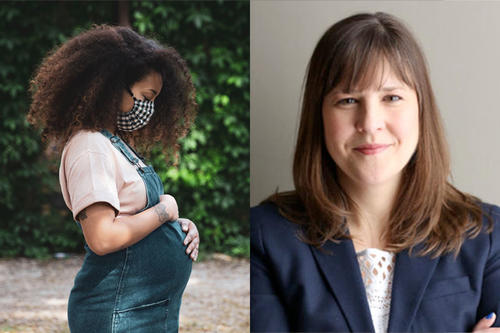
According to the Minnesota Department of Health, approximately 70,000 babies are born every year in the state. During COVID-19, new and expecting mothers are working with their health care providers to navigate unique challenges in accordance with recommendations from the Centers for Disease Control and Preventions (CDC).
Carrie Neerland, an assistant professor in the University of Minnesota School of Nursing and certified nurse-midwife, explains how new and expecting mothers can navigate prenatal, postpartum and labor during COVID-19.
Q: What should new and expecting mothers know about COVID-19?
Prof. Neerland: Because this is a novel virus, there is a lot we are still learning about SARS-CoV-2 and how it is impacting people, but we do know that new and expecting mothers and newborn babies are susceptible to the virus. Like other upper respiratory illnesses, COVID-19 could transfer to a mother or child when they come into contact with an infected, asymptomatic or presymptomatic individual.
It is important for pregnant individuals to seek out information from trusted sources, like the CDC, and to speak with their midwife, OB-GYN or primary care provider about concerns they may have during their pregnancy, labor and after they return home with their child.
Q: What are some changes that new and expecting mothers can expect for prenatal and postpartum clinical visits?
Prof. Neerland: Hospital and birth center staff are working very hard to limit the potential for new and expecting mothers to come in contact with individuals with COVID-19 by changing their approach to both in-person and telehealth clinical visits.
For prenatal and postpartum care, expecting parents will have more telehealth appointments with their midwife or primary care provider. Depending on the person's pregnancy risks, many of the recommended 12-14 visits are now over the phone or video conferencing. Physical, in-person visits are reserved for lab tests, ultrasounds and those who are identified with higher-risk pregnancies.
Providers are also using the recommended personal protective equipment during office visits and in the hospital or birth center to limit potential exposure for both patients and staff.
Q: How are health care professionals educating new and expecting mothers on safe practices during this time?
Prof. Neerland: Minnesota midwifery leaders have been meeting to assess the resources and support that new and expecting parents need during this time. As COVID-19 continues to spread, families and health care professionals have to prepare and advocate. Although we are in a pandemic, patients have the right to receive safe care that respects their individual preferences. This is the essence of midwifery care and why many more pregnant people are turning to midwives for their prenatal and birth care. We have also seen an increase in people seeking care with midwives in birth centers and their homes.
Hospitals and birth centers are encouraging safe-distancing measures, wearing face masks and face shields and are implementing new policies to help reduce the number of people — thus the potential for infection — in the birth setting. Such policies include limiting the number of in-person visitors to one person of their choosing, bringing all items, not leaving the hospital once they have arrived and turning to technology for families and doulas to provide virtual support. Doulas are an important part of the birth team and many are advocating for them to be allowed back in hospital settings as long as there is adequate personal protective equipment (PPE).
Q: What should new and expecting mothers talk about with their midwife or primary care provider?
Prof. Neerland: For mothers who have COVID-19, it is important to talk with their provider about current CDC guidelines related to person-to-person contact. Their provider should help them navigate the current evidence, as well as best practices regarding skin-to-skin and breastfeeding, and help them make the choice that is right for them and their infant. At this time, there is no indication that SARS-CoV-2 can pass to the baby in utero nor through breastmilk. It is also important for new mothers to talk to their midwife, primary care provider and family about physical and mental health support they may need while they recover from the virus.
Q: What is your research and clinical experience working with mothers on COVID-19?
Prof. Neerland: For research, I am currently collaborating with nursing and public health colleagues on a study that examines how COVID-19 may have impacted people’s birth, postpartum and breastfeeding experiences. In regard to COVID-19 in the clinical setting, my work has primarily focused on advocacy for pregnant and postpartum people, working with midwifery and obstetrician leaders to influence practice changes based on the evidence and not fear.
We are seeing Black, Indigenous and Latinx people, as well as immigrants, disproportionately affected by COVID-19 due to structural racism and social determinants of health. As health care providers and scientists, we need to address the systemic and root causes of these disparities including insurance and health care access, access to food and safe housing, as well as our own implicit biases and racism, inequitable clinical practices and institutional policies. Racism in healthcare was present before the pandemic, but it is now clearer than ever that we need structural changes in order to improve outcomes for Black, Indigenous and people of color.
Carrie Neerland is an assistant professor in the School of Nursing and a fellow of the American College of Nurse-Midwives. She specializes in midwifery and nursing research. Her current research examines nursing support in early labor, maternal confidence for physiologic birth, birth centers, and integration across birth settings. Neerland also practices full-scope midwifery at the Women’s Health Specialists Clinic and the University of Minnesota Medical Center.
About “Talking...with U of M”
“Talking...with U of M” is a resource whereby University of Minnesota faculty answer questions on current and other topics of general interest. Feel free to republish this content. If you would like to schedule an interview with the faculty member or have topics you’d like the University of Minnesota to explore for future “Talking...with U of MN,” please contact University Public Relations at [email protected].




